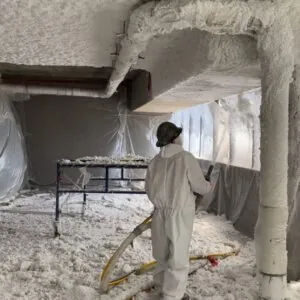Commercial Spray Foam Insulation Contractors
Providing Superior Insulation Solutions Since 1982
At Alpha Insulation & Waterproofing, we are qualified and trained by several different urethane foam manufacturers, including BASF and Icynene.
Let’s Work Together On Your Next Project
Contact Us Today for a Free QuoteSpray Foam Insulation for Commercial & Industrial Buildings
Batts and blankets are the most used insulation types for commercial properties, but sometimes spray foam insulation is the solution you need. There are established standards and regulations for spray foam applications in non-single-family buildings. This includes fire-resistance properties.
Spray foam insulation costs more than batts and blankets, but the payback for property owners is the monetary savings from lower energy bills. Insulation materials can be sprayed, foamed in place, injected or poured.
We have several spray polyurethane foam (SPF) solutions to seal commercial properties against air infiltration, including building envelope models that can exceed performance criteria for every code and climate:
- Almost-indestructible protective coatings
- Insulating air barrier wall systems
- Insulating sealant continuity components
- Seamless, leak-free insulating roofs
At its most basic, our high-performance SPF application for commercial buildings is a sustainable solution that requires minimal maintenance.
Alpha Insulation & Waterproofing is your experienced, knowledgeable partner for commercial property spray foam insulation solutions.
Call 972-446-2600 or contact Alpha Insulation & Waterproofing.
Why Spray Foam Insulation?
Spray polyurethane foam (SPF) is a complete insulation and air/moisture barrier that seals the building against air infiltration while providing the highest R-value per inch of any insulation available in the construction industry.
A typical 2×4 stud wall could only be insulated to an R-value of 13 with batting insulation, whereas that same wall cavity can be insulated to an R-value of 23 with urethane foam.
Let’s Work Together On Your Next Project
Contact Us Today for a Free QuoteFoam insulation is sprayed by trained technicians as a liquid and, a few seconds later, expands to many times its original volume. This liquid form expands and seals all penetrations, such as electrical outlets and plumbing devices.
Air cannot blow through polyurethane foam as it can with other materials. There is no gap between the urethane and the building materials to allow warm, humid air to condense.
Benefits of Spray Foam
Spray foam insulation can be used at any stage of construction or retrofitting:
- Enclosed existing walls
- Open new wall cavities
- Unfinished flooring
Its biggest advantage is that it can be used in irregularly shaped areas and around electrical and plumbing obstructions.
Closed-cell vs. open-cell insulation
Closed-cell spray foam insulation offers a greater R-value, moisture resistance and overall strength. While open-cell SPF costs less, you’ll need more of the material to attain the necessary R-value. Closed-cell spray foam also offers an integrated vapor barrier, and it’s necessary for use in any continuous insulation application.
Open-cell spray foam insulation is viable for commercial buildings’ envelope locations (exterior walls, roof/ceiling assemblies). When paired with rigid-board or fiber insulation, it offers superior performance.
The type of insulation your commercial property needs depends on several factors. Because you have choices, we will recommend the best solutions.
Call 972-446-2600 or contact Alpha Insulation & Waterproofing.
Why Alpha Insulation & Waterproofing?
IBP (Installed Building Products) is the second-largest insulation provider in the United States. As a member of the IBP Family of Companies, Alpha Insulation & Waterproofing can get the supplies and materials we need for your project faster. Our group purchasing power gives us lower prices, and we share those savings with our business partners.
Let’s partner to deliver affordable, quality spray foam insulation to your commercial property project. We’ll deliver what you need to meet project requirements, regulations, budget and turnaround time.
Call 972-446-2600 or contact Alpha Insulation & Waterproofing.
Spray Foam Insulation FAQs
Why is spray foam better than fiberglass?
Fiberglass batts provide good thermal performance, but only offer minimal protection against air intrusion and leaks. Spray foam offers excellent thermal performance, and because it expands to fill voids and seals tightly to nearby wood, metal and masonry surfaces, it also provides excellent air sealing. We specialize in spray foam insulation for commercial buildings.
Is spray foam waterproof?
Closed-cell foam can provide an excellent barrier against moisture intrusion once it has fully cured. It is often used as a mold- and moisture-resistant insulation in damp areas like crawl spaces and basements. At Alpha Insulation & Waterproofing, we use our quality spray foam formulation for insulation and waterproofing.
Does spray foam release VOCs?
During the curing process, spray foam will off-gas. Once it has fully cured, it releases virtually no VOCs and it is relatively inert. We recommend leaving the building unoccupied for up to 48 hours as the spray foam cures.
Where should spray foam be used?
Spray foam can be used nearly anywhere in a commercial building, from the walls, floors and ceilings to basements, parking structures, the underside of roof decks and more. It is moisture-, mold- and pest-resistant and provides an excellent barrier against vapor and air intrusion.
Our commercial insulation experts can recommend the best materials for each area of your commercial facility.
Will spray foam insulation lead to air quality issues?
When applied throughout a commercial building, spray foam insulation can provide an effective barrier against air leaks. This also reduces the amount of fresh air coming in, but in a well-designed building, these air quality concerns will be counteracted by using energy-recovery ventilation systems and make-up air units.
Our team will recommend solutions that can help you achieve the ideal balance between air quality and energy efficiency.


